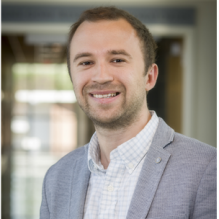Alexander Mironenko
Assistant Professor
University of Illinois Urbana Champaign
Department of Chemical and Biological Engineering
Catalysis Meets Quantum Mechanics: Accurate and Low-Cost Predictions of Complex Solvation and Reactivity Phenomena
The transition from fossil fuels to renewable energy calls for discoveries of new catalytic materials that will enable novel chemical transformations linking renewable energy sources (biomass, water, carbon dioxide, solar light) and high-quality fuels and value-added chemicals. Modern computational methods provide unique atomic-level insights into catalytic processes, often invisible to experimental techniques, and promise to reduce the reliance on tedious “trial-
and-error” experimentation in catalyst design. The challenge lies in the high complexity of realistic computational models that comes with a steep increase in computational cost.
In this talk, I describe three case studies showcasing the power of current and emerging computational methods to describe complex phenomena in heterogeneous catalysis at low computational cost and with near-quantitative accuracy. In case I, I describe our success in revealing the origin of the unexpectedly high formic acid electro-oxidation activity of an -MoC catalyst – an easily oxidizable material. We attribute its high catalytic activity to the self-limiting surface oxidation that exposes MoCxOy oxycarbide motifs with unique electronic properties. In case II, I highlight our efforts in making reliable predictions of adsorption enthalpies of up to 55-atom molecules in hydrophilic (defected) and hydrophobic (pristine) microporous Lewis- acidic zeolites from dilute liquid solvent mixtures in complete agreement with calorimetry measurements. The structure of the complex environment inside the pores, observed with an atomistic resolution, is shown to influence the rates of zeolite-catalyzed reactions, such as alkene epoxidation by H2O2. In case III, I discuss how applying ideas from thermodynamics to quantum chemistry leads to a simple, highly accurate, and non-empirical method for making predictions of chemical reactivity at a low cost with broad implications across chemistry, catalysis, and materials science.
Bio
Dr. Alex Mironenko is an Assistant Professor at the Department of Chemical and Biomolecular Engineering at the University of Illinois, Urbana-Champaign. His research lies on the boundary between computational heterogeneous catalysis, fundamental quantum mechanics, and molecular simulations and focuses on developing new methods to understand the workings of real catalysts for renewable energy applications. Before joining the University of Illinois in 2020, he was the Kadanoff-Rice Postdoctoral Fellow in Physical Chemistry at the University of Chicago. Alex Mironenko earned his Ph.D. in chemical engineering from the University of Delaware in 2018. He received a number of awards, including the ACS Petroleum Research Fund Doctoral New Investigator Award (2021), Allan P. Colburn Outstanding Dissertation Prize (2019), J. William Fulbright Fellowship (2010-2012), Department of Energy EFRC Achievement Award (2016), Theodore A. Koch Award from the Catalysis Club of Philadelphia (2016), and Richard J. Kokes Award for the 24th North American Catalysis Society Meeting (2015).
Wednesday, March 15, 2023

Alexander Mironenko
Assistant Professor
Department of Chemical and Biological Engineering
University of illinois Urbana Champaign
- Time: 11:00 AM
- Location: 206 Furnas Hall